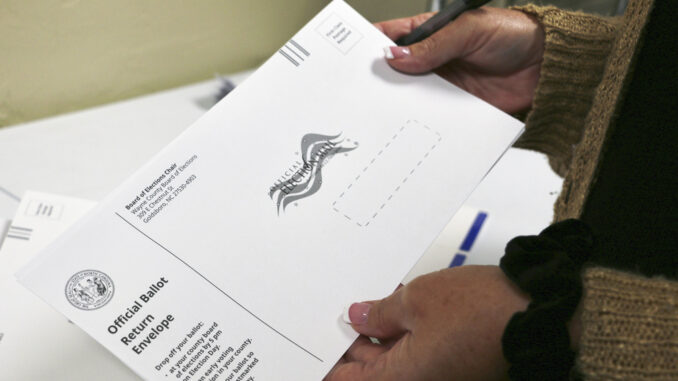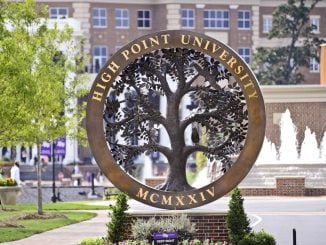
RALEIGH — A previous report by North State Journal uncovered the North Carolina’s current absentee ballot portal had been a topic of discussion well before the pandemic hit in March of 2020. That report also detailed security issues with the portal, powered by Democracy Live, as well as an outside money funding offer to cover the cost.
Tusk Philanthropies was the source of the grants offered to election officials in North Carolina by Democracy Live to implement absentee ballot portals using their products. The N.C. State Board of Elections (NCSBE) has indicated they did not ask for nor receive any grant money from Tusk.
North State Journal learned of the Tusk Philanthropies grant as part of a records request containing emails sent in 2019 between Democracy Live and the NCSBE that mentioned a Tusk Philanthropies “Modernizing Democracy Grant Program.”
Tusk Philanthropies, formed in 2017, is one of several properties housed under Tusk Venture Partners, a New York-based venture capital firm. Other offshoots include Tusk Strategies, Tusk Digital, Tusk Ventures, and Tusk Holdings.
The man behind the Tusk properties is Democratic political strategist Bradley Tusk, who was the acting campaign manager for Michael Bloomberg’s successful 2009 mayoral re-election bid. He had also served as communications director for U.S. Senator Chuck Schumer and was named Deputy Gov. of Illinois in 2003 by then-Governor Rod Blagojevich, who later would be impeached and convicted on federal corruption charges.
Tusk Philanthropies has two primary campaigns it pours money into; “mobile voting” and “anti-hunger.” Bradley Tusk himself appears to lead the mobile voting team and on the Mobile Voting Project website Tusk is quoted as saying “The 20 mobile voting pilots we’ve completed to date have shown that mobile voting is not only possible, but a preferred method of voting.”
At the time Democracy Live was contacting states to use their ballot portal, Sheila Nix was the President of Tusk Philanthropies.
Nix’s profile was removed from the Tusk Ventures site sometime after December of 2020. The removed profile stated Nix was “most recently” the Chief of Staff to Jill Biden and previously “served as a Deputy Assistant to President Obama, was Chief of Staff to Vice President Biden on the 2016 re-election campaign.”
On Jan. 21, 2021, Nix was appointed by the Biden administration as Chief of Staff for the U.S. Department of Education despite having no apparent education-related background.
Also of relevant interest is that Nix is married to James (Jim) Coughlan, a partner at the Perkins Coie legal firm which has been the subject of national headlines as a result of Special Council John Durham’s ongoing investigation into the 2020 election and Russia-gate hoax.
Another former Perkins Coie partner, Marc Elias, is a well-known name in North Carolina. Elias left the firm in August of 2021. A few months later, Elias’ colleague at both at Perkins Coie and on the Hillary Clinton campaign, Michael Sussman, was indicted by Durham and it was also learned that in January of 2022, Elias had testified in front of a Grand Jury related to Sussman’s activities.
Upon departing Perkins Coie, Elias formed an elections-centered law firm of his own called “Democracy Docket, LLC.” Elias used this firm to sue North Carolina and multiple states leading up to the 2020 Election. Those states include Arizona, New Mexico, Texas, Colorado, Montana, Minnesota, Iowa, Illinois, Wisconsin, Michigan, Pennsylvania, New York, New Hampshire, North Carolina and Georgia.
North State Journal asked if NCSBE Executive Director Karen Brinson Bell had any contact or meetings with employees of Tusk Philanthropies and was told that “Karen Brinson Bell has no record of meeting with them, nor does she recall doing so.”
However, emails obtained through records requests demonstrated otherwise.
Included was a March 27, 2020, email from Tusk Strategies’ Aileen Kim to Brinson Bell titled, “The Case for Mobile Voting.pdf; MV and Coronavirus.pdf.” The email shows Kim was writing to Brinson Bell “on behalf of Sheila Nix,” and Nix was copied on the email.
Another of the emails, titled, “Tusk Philanthropies Grant – Online Ballot Delivery Pilot Project,” was sent to Brinson Bell by a man named Hugh Gallagher, residing in Glen Allen, Virginia. The email Gallagher used was not an official Tusk group or Democracy Live email address, but rather a personal Gmail address. The content of the email was an offer to discuss the Tusk Philanthropies grant with Brinson Bell.
It is unclear how Gallagher is tied to Tusk or Democracy Live, why he used a personal Gmail account to contact the NCSBE, or how he entered the conversations surrounding North Carolina’s absentee ballot portal, however, it appears he founded and runs an elections and voting systems related company called Scytl USA, LLC, which is based in the same town as the address Gallagher listed in his email.
Tusk Philanthropies has yet to respond to repeated requests for comment.
Emails obtained by North State Journal show conversations between NCSBE staffer Veronica Degraffenreid, Bell and Democracy Live’s Brian Finney beginning in June of 2019. Some of the emails addressed a grant opportunity and others centered on a “UOCAVA and accessible absentee solution.” UOCAVA stands for Uniformed and Overseas Citizens Absentee Voting Act.
In a Sept. 10, 2019, email to Degraffenreid, Finney first mentions “new grant funding” for modernizing and securing UOCAVA. Degraffenreid responds the same day asking him to send an estimate.
In a Sept. 18, 2019, email reply, Finney identified that the grant would be coming from the Tusk Foundation and that the grant could “fund 80-90% of the cost.”
Degraffenreid declined a conversation with Tusk at that time and asked for a quote for using Democracy Live’s services. Finney would later respond to the NCSBE by providing a quote for services.
“In order for us to give you a quote, do you know if the State has access to all the ballots/ballot data from the counties?” Finney asked Degraffenreid. “This impacts costs due to whether we need to work with all the counties, or just the State to upload the ballot data.”
Degraffenreid replied, “We do have all of the ballot data and ballot images. The services we would be interested in is having a secure portal for the following tasks: CBE uploads voter’s ballot (pdf image), Voter accesses secure portal to retrieve ballot (ballot and materials must be printed), and Voter accesses secure portal to upload voted ballot and balloting materials.”
Finney later responded with answers to her questions with baseline pricing of a $79,000 one-time fee and a $59,000 per year annual license fee.
According to vendor records provided by the NCSBE, Democracy Live was paid a total of $423,950 in 2020 by the NCSBE for its services.
Based on Finney’s estimate that the Tusk grant would cover 80 to 90% of the costs, had the NCSBE taken the Tusk grant, the amount the state would have received in that grant could have been up to or over $339,160.
Finney emailed Degraffenreid again on Sept. 25, 2019, asking if her team wants a demo and that he may be traveling to Raleigh and that he has an “Amazon colleague.” None of the emails North State Journal received indicate whether or not that meeting ever took place.
On Oct. 2, 2019, Degraffenreid emailed Finney back and asked “Do you have information that only speaks to the ballot transmittal and ballot delivery portal? Again, we are only interested in a means for a voter to receive a pdf of a UOCAVA ballot and a way for the voter to securely return their ballot that has been hand-marked.”
Finney responded that Omniballot has been deployed in over “1,000 elections,” and included a presentation on “OmniBallot Secure Balloting Portal.” In his reply, Finney also stated that Democracy Live’s OmniBallot system has “never had any successful attacks or penetration.”
Finney checked back on Oct. 18, 2019, but there is no response from Degraffenreid. He emailed Degraffenreid again on Oct. 17, 2019, asking if her team has discussed updating the UOCACA system, but this time mentioning “$250M” coming out of “Capitol Hill” to modernize voting systems.
“That funding can be used to immediately secure and modernize ballot delivery systems. In the past, we upgraded other states to our secure ballot portal, contingent on funding. Is this something you would like to discuss?” Finney asked.
It is unclear from the email exchange what entity is the source of the “$250M” mentioned by Finney, but election-related issues and work would later be supported by federal COVID relief funding in 2020.



